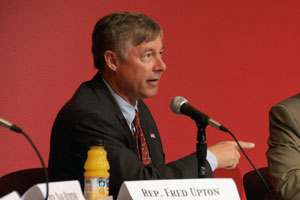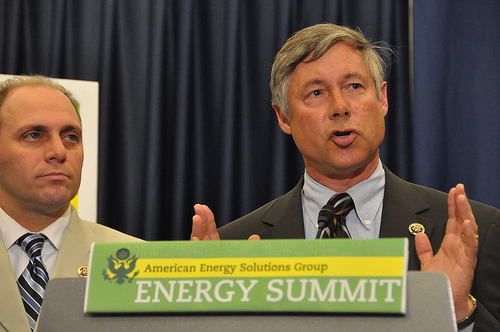The American Petroleum Institute, which last year called congressional efforts to curb climate changing emissions, among other things, “a giant tax,” a “job killer,” and “fundamentally flawed,” is now begging for Congress to take action—to stop the Environmental Protection Agency from regulating those emissions, that is. In a speech laying out the priorities of the oil industry’s top trade for the new year on Tuesday, API president Jack Gerard pledged to fight the coming EPA regulations.
EPA regulations of greenhouse gases began phasing in on Sunday, though their progression will be slow and the major rules for power plants and oil refineries aren’t even expected until the second half of 2012. The EPA rules came after a 2007 Supreme Court ruling that the agency could in fact regulate greenhouse gas emissions under the Clean Air Act if it determines that the gases endanger human health, and after both the Bush and Obama administration EPA did in fact reach that conclusion in 2008 and 2009, respectively. While a new law from Congress dealing with greenhouse gases was the preference of most folks following the issue (enviros, business, and the administration included), the Senate decided not to deal with it last year. And now the EPA is following through with actions as the agency is compelled to by the Supreme Court, the Clean Air Act, and its executive branch authority.
But API—as well as some House members and senators on both sides of the aisle—wants the agency’s regulations shut down. “We do not support and strongly oppose the EPA unilaterally regulating greenhouse gas emissions,” said Gerard. “We believe it is in the purview of the United States Congress to regulate greenhouse gases.” The EPA, he said, “has overstepped its bounds.” He also said API “will support the means necessary to make sure Congress makes that decision,” noting there are multiple options available to do so but not offering any preference for how legislators could do that.
To sum up: The EPA was directed to act on this issue, which it has. Congress had almost four years after the Supreme Court decision to put in place a new law that woud supersede EPA regulations. But industry groups like API balked at the options that Congress came up with, and in the end, the Senate never passed anything at all—which has basically forced the EPA to act. Now industry groups are griping that Congress should act, not EPA.
One option for blocking the EPA, which incoming Energy and Commerce Chair Fred Upton (R-Mich.) floated this week, is to pass a resolution of disapproval under the Congressional Review Act. This obscure maneuver allows Congress to block a regulation from the executive branch within 60 days of publication in the Federal Register. Upton was in the audience for Tuesday’s API event, and it’s pretty much assured that if Upton does pursue that option, API will support him.
On the broader issue of climate change—you know, the issue those regulations were designed to address in the first place and the issue that Gerard says he prefers that Congress deal with—Gerard predicted that “the climate discussion will likely be put off for another day.” While he noted that “there may be a time in the future when we come back to the climate dialogue,” he didn’t seem to think that would be anytime soon. “I think it’s a question of priority,” said Gerard. “Right now I think the American people have made it clear they want the focus to be on job creation.”
Gerard’s other priorities for the year included urging the Obama administration to reconsider its decision to delay lease sales in the Gulf of Mexico and reverse the decision to open new areas to drilling in the Atlantic and Pacific coasts, which was made in respons to the Gulf oil spill. Gerard also called for “additional access” to oil and gas reserves on land and in the Outer Continental Shelf, and decried any move that would amount to “increasing taxes on oil and natural gas.” (While Gerard refers to attempts to “raise taxes,” what API usually means by that is efforts to end subsidies and close the loopholes the industry currently enjoys—which the Obama administration has proposed cutting in past budgets.) Doing so, said Gerard, would “result in the loss of tens of thousands of jobs.”
There wasn’t much new really in Tuesday’s speech, but a good idea of what to expect from the oil industry in 2011.






